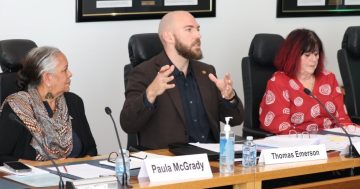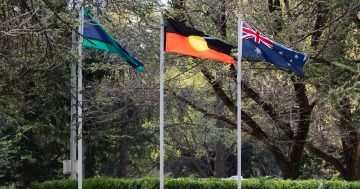
Auditor-General Michael Harris: reporting is not complete, and lacks structure and neutrality. Photo: File.
ACT Government agencies have been found wanting in their oversight and implementation of the 2019 agreement with the Territory’s Aboriginal and Torres Strait Islander people intended to improve the delivery of government services.
An ACT Auditor-General report found problems with governance, reporting and consultation that undermined attempts to improve services and the self-determination aspirations of First Nations people.
The report found that a great deal of cultural change within agencies was still required to realise effective implementation of the agreement and meet its goals.
It said governance arrangements for oversight implementation had not been effective, with 24 of 99 priority actions included in the 2019 Agreement’s 10 focus area action plans not adequately addressed.
Auditor-General Michael Harris said reporting by directorates on the implementation of the 2019 agreement did not enable Aboriginal and Torres Strait Islander communities to hold the government to account.
“Directorate implementation plans are not publicly reported and reporting is not complete, lacks structure and neutrality,” he said.
“This prevents stakeholders from understanding how the 2019 agreement is being implemented.”
The report found that directorates were not yet able to demonstrate their ability to support self-determination, saying that consultation activities were small-scale and had only recently commenced.
“While this shows some positive signs, the results of these efforts are not presently understood or observed broadly across local Aboriginal and Torres Strait Islander communities,” the report said.
“Significant and sustained effort by ACT Government directorates, working closely with communities and their leaders, will be necessary to change this.”
The report said the key input of the Aboriginal and Torres Strait Islander Elected Body had been limited by the part-time nature of the seven members’ roles.
“Elected Body members have a small amount of time available to complete their responsibilities,” Mr Harris said.
“Each member carries a significant expectation to work with directorates and hold them to account for delivering the Agreement as well as working with Aboriginal and Torres Strait Islander communities.”
The report also noted the low voter turnout for the elected body and that most of the seven members were former government employees, urging more diverse representation and greater participation.
The inter-directorate committee responsible for producing six-monthly progress on the implementation of the agreement only produced two reports – one in November 2019 and another in September 2020.
There had been no progress reports or alternative reports since monitoring the completion of the priority actions under the agreement and annually reported performance measures continued to lack specific targets, the report said.
“Directorates’ reporting of their activities to implement the 2019 Agreement, as shown in their 2020-21 annual reports, did not provide a faithful representation of their activities,” the report said.
“It is not possible for users to understand the impact of directorate activity to implement the 2019 agreement.”
The report made eight recommendations to improve directorates’ transparency and accountability for implementing the 2019 agreement, as well as to strengthen support for the Elected Body.
The government response accepted the audit findings and welcomed acknowledgement of steps being taken to address them.
It noted the impact the COVID-19 public health emergency had on the government’s ability to deliver some of the agreement’s goals.
“The ACT Government will continue to review arrangements and consider how the elected body can be better supported to fulfil its role in the agreement,” the response said.
Original Article published by Ian Bushnell on Riotact.











